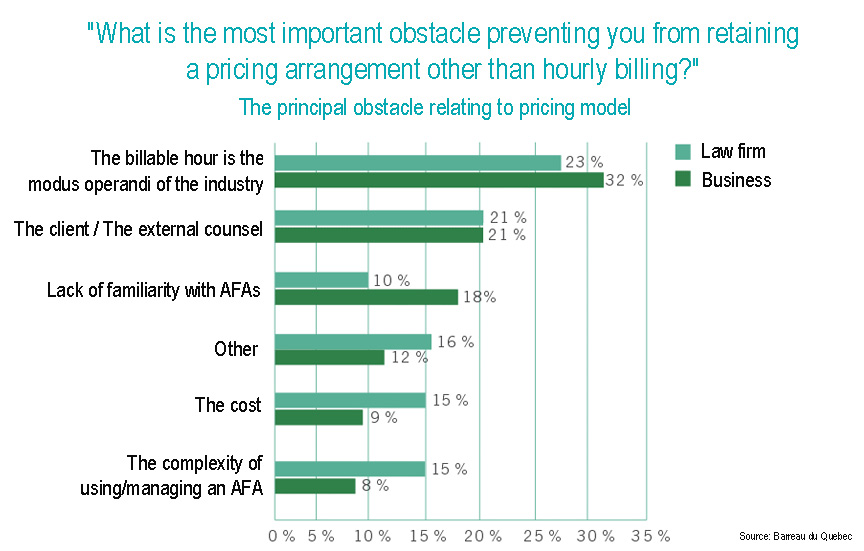The Barreau du Québec has issued an in-depth report calling on lawyers to transition away from hourly billing — not only to enhance efficiency for corporate clients but also to foster greater access to justice for individual clients and provide a more balanced professional life for lawyers.
 The 84-page report, entitled "La tarification horaire à l’heure de la réflexion" (Hourly Billing: A Time for Reflection), surveyed 942 external and in-house counsel across the province to create a comprehensive deconstruction of perceptions and realities around hourly billing and alternative fee arrangements.
The 84-page report, entitled "La tarification horaire à l’heure de la réflexion" (Hourly Billing: A Time for Reflection), surveyed 942 external and in-house counsel across the province to create a comprehensive deconstruction of perceptions and realities around hourly billing and alternative fee arrangements.
Addressing the disturbing reality that fewer Quebecers are choosing to access the legal system for fear of runaway costs, the Barreau is calling for nothing less than a paradigm shift in how legal billing is carried out in the province.
The Barreau argues that firms, instead of serving the interests of the partnership, should be doing a better job serving the interests of clients — whether those interests lie in the efficiency of a fixed or flat-fee structure, or the predictability of a fee that’s conditional on outcome or duration.
[Translated:] “It’s as much a matter of the survival of the profession as it is about the urgency to respond to the access-to-justice needs of citizens,” said Barreau president Claudia Prémont in a statement.
“Our finding is that the legal profession needs to adapt, notably by introducing pricing systems that have emerged since the turn of the century other than the billable-hour model. The Barreau’s priority, in the wake of this study, is to equip lawyers with the tools they need to change their business models and foster an environment for innovative solutions.”
Despite ostensible agreement on the desirability of alternative fee arrangements, the study found 70 per cent of private practitioners continue to rely on hourly billing.
Standing in the way of change, beyond veiled profit motives, seems to be simple inertia, with 51 per cent of in-house lawyers reporting no difference in the quality of work under AFAs, while external counsel see little profit motive for adapting.
External and in-house counsel seem to be, in addition, prone to blaming each other for opposing reform. When asked what the greatest obstacle was preventing their adoption of AFAs, external counsel (23 per cent) and in-house (32 per cent) both said “that’s the way business is done.”
The second biggest obstacle, however, was their legal counterpart, with 21 per cent of external counsel pointing to the client as an obstacle, and 21 per cent of clients pointing to the external counsel as an obstacle.
Antoine Aylwin, vice president of the Barreau, says the dominance of the hourly billing structure has resulted in skewed incentives, with lawyers placing thoroughness above other virtues including the client’s interests.
“The hourly rate created the incentive to be very thorough in their files — you know, to turn every stone and to make sure that they covered all aspects, which in some cases might be what the client needs or is seeking. But it’s not a one-size-fits-all solution. Sometimes the best outcome is a quick outcome, and if the incentive is to drag the case on to bill more hours, you won’t get that result.”
Aylwin notes that the prevalence of hourly billing has also, over the past 50 years, had profoundly negative effects on the working lives of lawyers. The profession is less co-operative, given that lawyers cannot bill hours spent helping colleagues with their respective files.
The system also creates perverse incentives to work innumerable hours to prove one’s worth:
“You hear very frequently from lawyers who leave private practice that their biggest relief is to stop docketing,” says Aylwin.
“You always have that pressure to add more hours to the sheet, and to be able to be profitable and to show it. And you receive better compensation for it, and you’re evaluated on it,” he says. “There’s always that pressure. Not the pressure to get the best results for the client, but the pressure to bill hours.
The Barreau’s report, by raising awareness, is only the first step in the law society’s goal to encourage change within the industry, says Aylwin.
“We will also be organizing a conference about solutions, about how can we bill our clients differently, how we can share the risk, how we can increase predictability . . . and bring tools for lawyers to be able to evaluate fixed-fee arrangements.”
Training sessions will be rolled out within the next six months. No dates have yet been announced for the planned conference.










